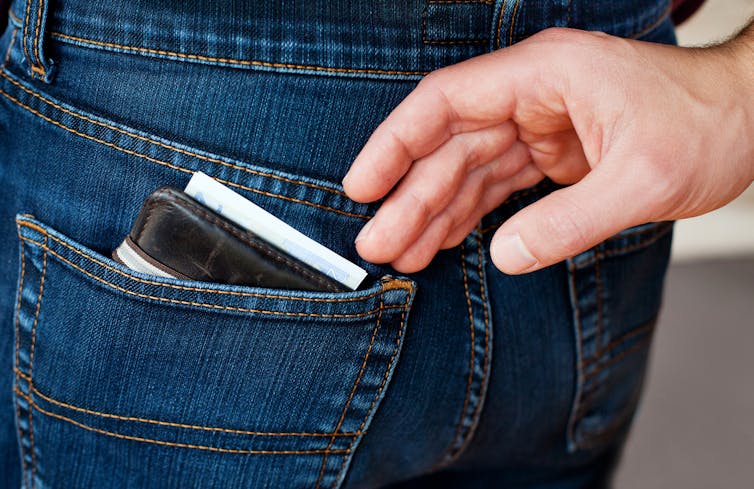Why hasn’t the Albanese government criminalised wage theft? Associate Professor Giuseppe Carabetta from UTS Business School explains.

Shutterstock
Australia’s first criminal case over wage theft is under way, with charges laid against the owner of a Victorian restaurant that allegedly underpaid staff by thousands of dollars.
If found guilty, the owner of the Macedon Lounge, northwest of Melbourne, faces a fine of more than $1 million and potentially jail time under Victoria’s Wage Theft Act.
The law came into effect in July 2021. The Andrews Labor government promised it before the 2018 state election, as evidence mounted that existing civil penalty fines were not a sufficient deterrent.
This week Unions NSW called for national action in a report on underpayment of migrant workers. This was based on an audit of job advertisements on Chinese, Korean, Nepalese, Punjabi and Spanish websites. It found 70% offered less than minimum rates.
The Albanese government also made a pre-election promise to criminalise wage theft, as part of its Secure Australian Jobs Plan:
Wage theft rips more than $1 billion off Australian workers each year. The Morrison government doesn’t think it’s a problem, but Labor does, and we will make wage theft a crime at a national level.
This was left out of the omnibus amendments to the Fair Work Act passed last week. It’s unclear whether the government will pursue this further in its first term.
But criminalisation may not be the best approach. Other reforms are just as important.
Now a broad-scale problem
It is clear wage theft and other forms of non-compliance with minimum labour standards are a major problem in Australia.
Prominent employers that have underpaid workers or been accused of non-compliance include restaurants owned by celebrity chefs Heston Blumenthal, Shannon Bennett, George Calombaris and Neil Perry; franchises 7-Eleven, Pizza Hut and Domino’s; and blue-chip companies Bunnings, Coles, Commonwealth Bank, Qantas and Woolworths. Even institutions such as Deakin University and the ABC have been implicated.
The issue has been the focus of numerous public inquiries, reviews and consultations and media investigations.
A Senate committee inquiry into wage theft that reported in March 2022 noted wage theft goes back at least to the 1880s, with the rampant stealing of Indigenous wages.
But wage theft on a broad scale, the inquiry concluded, is a relatively new phenomenon:
The rate of unlawful underpayment complaints and media reporting increased markedly from around 2015, with mounting evidence that wage theft practices have become widespread in the hospitality, retail, horticulture, franchise-heavy and higher education sectors.
Workers most vulnerable
The workers most vulnerable are migrants on temporary visas, young people, those in “low-skilled” jobs, non-unionised employees, and those in casual and insecure work (the reason for its prevalence in higher education).
The problem is intensified by “fragmented” employment arrangements that obscure who profits from non-compliance, such as labour hire chains featuring multi-layered subcontracting and outsourcing arrangements, or on-demand platform “gig” work.
As Alan Fels, former chair of the Australian Consumer and Competition Commission, has pointed out, wage theft makes it hard for compliant employers to compete.
It also affects government revenue – for example, in cases where payroll tax is avoided by having staff “off the books”.
Call for criminalisation
The 2022 Senate inquiry made 19 recommendations. The first was that the federal government amend the Fair Work Act to make any form of remuneration theft – including failing to pay employees their rightful loadings, penalty rates, overtime, leave, allowances and superannuation – a criminal offence. (The second recommendation was that it increase civil penalties.)
Criminal sanctions may elevate awareness and provide another avenue for redress, but whether they would foster greater employer compliance is doubtful.
This is because these would only apply to deliberate breaches, when many cases of non-compliance involve genuine and unintentional mistakes.
Nor will criminal sanctions do anything to assist employees to easily seek redress, given they are about punishment and not compensation.
There are other, better approaches
A better approach is to focus on enhanced enforcement, expanding the role of the Fair Work Ombudsman and and other regulatory agencies to investigate, enforce and recover unpaid money, with significant extra resources to do so.
This a key part of the Victorian legislation, which has established the Work Inspectorate of Victoria with resources to investigate and enforce the law.
Another reform would be to oblige employers – particularly those in high-risk sectors – to have ongoing compliance regimes in place and to regularly review their payroll processes to ensure compliance.
Finally, as recommended by the Senate inquiry report, there should be a clear avenue for the Australian Securities and Investments Commission to disqualify directors of companies found to have engaged in systemic non-compliance.
Perhaps then the message will start to get through.![]()
Giuseppe Carabetta, Associate Professor, University of Technology Sydney
This article is republished from The Conversation under a Creative Commons license. Read the original article.